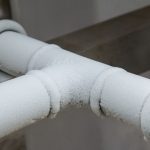 As the temperature drops during the winter months, one common concern for homeowners is the possibility of pipes freezing. When water freezes in the pipes, it expands and can cause them to burst, resulting in costly damage and repairs. To prevent this from happening, here are five essential tips to keep your pipes from freezing during winter.
As the temperature drops during the winter months, one common concern for homeowners is the possibility of pipes freezing. When water freezes in the pipes, it expands and can cause them to burst, resulting in costly damage and repairs. To prevent this from happening, here are five essential tips to keep your pipes from freezing during winter.
1. Insulate Your Pipes
Proper insulation is crucial to protect your pipes from freezing temperatures. First, identify the pipes that are most at risk, such as those located in unheated areas like basements, attics, crawl spaces, and garages. Then, insulate them using foam pipe insulation or heat tape. These materials act as a barrier, reducing the chances of heat loss and preventing the pipes from freezing. Additionally, insulating your hot water pipes will help retain heat, saving energy and reducing your utility bills.
2. Maintain a Consistent Temperature
Maintaining a consistent temperature within your home is key to preventing your pipes from freezing. While it’s tempting to lower the temperature at night or when you’re away to save on heating costs, doing so can increase the chances of your pipes freezing. To avoid this, set your thermostat to a consistent temperature, ideally above 55 degrees Fahrenheit. If you’re leaving for an extended period, consider keeping your thermostat set to maintain a minimum temperature to prevent freezing.
3. Allow Faucets to Drip
When temperatures dip below freezing, allowing faucets to drip can help prevent pipes from freezing. Running water through the pipes, even at a slow trickle, can provide enough movement to prevent freezing. This is particularly effective for faucets located on exterior walls or in unheated areas. Remember to only allow the faucets to drip hot and cold water pipes that are exposed or at risk of freezing. However, it’s important to note that this should not be a permanent solution and should only be done during extreme cold temperatures.
4. Seal Cracks and Openings
Inspect your home for any cracks or openings that could allow cold air to enter and compromise your pipes. Start by sealing any gaps in windows and doors with weatherstripping or caulk. You should also insulate any holes or gaps around pipes that enter your home from the outside, like where your outdoor faucet or cables enter. By sealing these areas, you can prevent cold drafts from reaching your pipes and reduce the risk of freezing.
5. Disconnect and Drain Outdoor Hoses
Before the first freeze of the season, it’s crucial to disconnect and drain your outdoor hoses. Leaving hoses attached can cause water to freeze within them, leading to damage to both the hose and the connected faucet. To do this, turn off the outdoor water supply, disconnect the hoses, and let any remaining water drain completely. Store the hoses indoors or in a shed to keep them protected from the cold weather. If you have an outdoor faucet, consider installing a faucet cover to provide an extra layer of insulation.
Summary
Preventing your pipes from freezing during winter requires taking proactive steps to protect them from extreme temperatures. By insulating your pipes, maintaining a consistent temperature, allowing faucets to drip, sealing cracks and openings, and disconnecting and draining outdoor hoses, you can minimize the risk of frozen pipes and avoid costly repairs. Remember, it’s always better to be prepared and take preventative measures than to deal with the consequences of burst pipes during the winter months.
Need an Underground Pipe Company in Dalton, GA?
Established in 2021, Grade-1 Underground is your number-one go-to company for your underground pipe needs. From Water mains to sewer lines, we have you covered. Grade-1 Underground also provides site work such as excavation, grading, land clearing, and much more. For any questions, please give us a call today!
